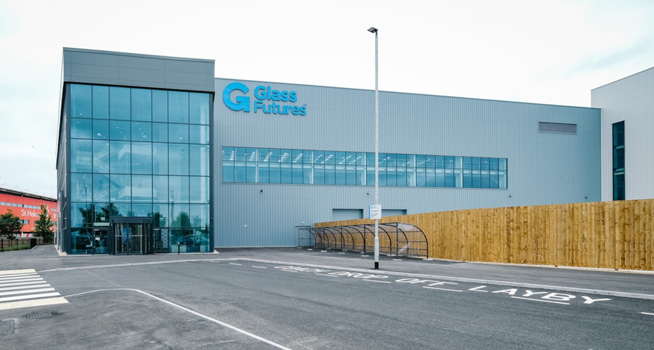website maker Glass Futures‘ experimental glass-making facility in St Helens, UK, is set to pave the way for significant emission reductions in glass manufacturing with support from Siemens technology.
The GBP 54 million R&D project – funded by a combination of government support and its membership businesses – will model and develop an optimised approach for ‘boosting’ glass furnaces with electrical heating. Industry body British Glass estimates this approach will cut UK emissions from glass manufacturing by 56 percent.
The site, which will have capacity to produce 30 tonnes of glass per day when fully operational in late 2024, is the first facility to adopt Siemens’ newest digital control system, PCS Neo, to unify and manage all its plant operations.
George Myers, control systems engineer at Glass Futures, said, “Decarbonising the manufacturing process is vital with global demand for glass set to keep rising in the years ahead.
“Using electric boosting and hydrogen to melt glass provides us with a route to achieve that, and our ambition at St Helens is to model and develop a solution that large-scale manufacturers can adopt or learn from, paving the way for more efficient furnaces around the world.
“Our partnership with Siemens will provide the technology to make this possible. People working from anywhere in the world will be able to monitor the entire facility from one unified communications pathway, which will generate new insights and enable people across the world to learn about the project and process.”
Stephen Haigh, head of glass industry UK & Ireland at Siemens, said, “This revolutionary project will leverage the power of cross-industry collaboration and the potential of new digital technologies to deliver much needed, significant emission cuts across glass manufacturing.
“PCS Neo represents the culmination of three decades of development and real-world testing. By reducing the complexity of data collection and analytics at the site, and by simplifying operations at this test stage and subsequently in full-scale glass plants, PCS Neo will play a vital role in unlocking the ambition at the heart of this project.
“Importantly, it will provide Glass Futures – other future projects across the world – with flexibility when it comes to deploying their people, independent of role or location, and enabling global engagement and learning.”


